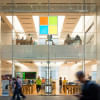Microsoft to build AI for nuclear reactor approvals

Microsoft is delving into the world of artificial intelligence (AI) to ease the complex approval process for next-generation nuclear reactors. The tech giant aims to leverage small modular reactors (SMRs) to meet the escalating electricity demands driven by the widespread use of OpenAI's ChatGPT, with 100 million weekly users as of November 2023, according to techcrunch.
Microsoft has invested USD 13 billion in OpenAI and also contributed in constructing the vast supercomputer used to train OpenAI's generative AIs. Furthermore, Microsoft's data centres supply the processing power essential for running these AI models.
The choice of nuclear energy, particularly from SMRs, aligns with Microsoft's strategy to meet increased power requirements while prioritising sustainability. Unlike traditional power sources such as coal or natural gas, nuclear power doesn't produce carbon emissions. Moreover, nuclear reactors operate independently of weather conditions, offering a consistent energy supply, unlike other carbon-neutral options like solar or wind.
Obtaining approval for new nuclear reactors, specifically SMRs, is a costly and intricate process. NuScale, a nuclear power company, is the only company that has successfully navigated this approval route, spending USD 500 million, presenting a 12,000 pages long application supported by over 2 million pages of documents.
In order to simplify the regulatory process, Microsoft has collaborated with Terra Praxis, a nonprofit dedicated to decarbonisation. Together, they aim to train a generative AI that can assist in crafting the requisite documents for the approval of new nuclear reactors.

 For all latest news, follow The Daily Star's Google News channel.
For all latest news, follow The Daily Star's Google News channel. 








Comments